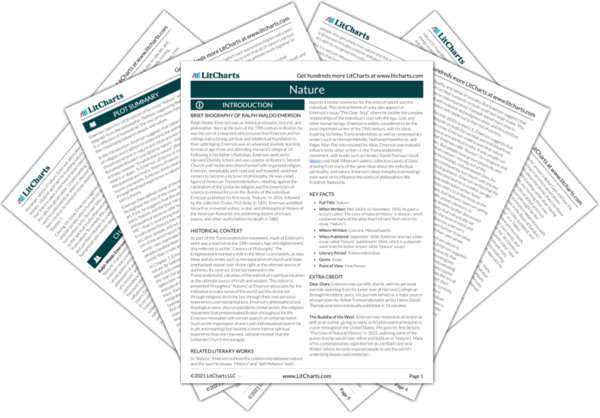Welcome to the LitCharts study guide on Ralph Waldo Emerson's Nature. Created by the original team behind SparkNotes, LitCharts are the world's best literature guides.
Nature: Introduction
Nature: Plot Summary
Nature: Detailed Summary & Analysis
Nature: Themes
Nature: Quotes
Nature: Characters
Nature: Terms
Nature: Symbols
Nature: Literary Devices
Nature: Theme Wheel
Brief Biography of Ralph Waldo Emerson

Historical Context of Nature
Other Books Related to Nature
- Full Title: Nature
- When Written: Mid-1830s (in November 1833, he gave a lecture called “The Uses of Natural History” in Boston, which contained many of the ideas that he’d later flesh out in his essay “Nature”).
- Where Written: Concord, Massachusetts
- When Published: September 1836 (Emerson also has a later essay called “Nature,” published in 1844, which is a separate work from his better-known 1836 “Nature” essay).
- Literary Period: Transcendentalism
- Genre: Essay
- Point of View: First Person
Extra Credit for Nature
Dear Diary. Emerson was a prolific diarist, with his personal journals spanning from his junior year at Harvard College up through his elderly years. His journals served as a major source of inspiration for fellow Transcendentalist writer Henry David Thoreau and were eventually published in 16 volumes.
The Buddha of the West. Emerson was revered as an orator as well as an author, giving as many as 80 philosophical lectures in a year throughout the United States. (He gave his first lecture, “The Uses of Natural History,” in 1833, outlining some of the points that he would later refine and build on in “Nature.) Many of his contemporaries regarded him as a brilliant and wise thinker whose lectures inspired people to see the world’s underlying beauty and mysticism.












